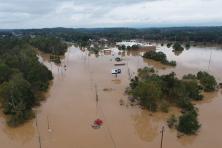Recently we asked for feedback on our Climate Cast biweekly news bulletin, and you told us: more stories on clean energy solutions… more offerings of actions you can take right now… and a more concise presentation. So here you go! Thanks for your input; hope you find the new ClimateCast informative and useful.
Electric trucks are coming… but not fast enough
A new study celebrates the increasing adoption of electric trucks, concluding that EV trucks will be mainstream by the year 2040—either surprisingly soon or woefully far in the future, depending on your sense of climate urgency. Expanding vehicle electrification is a huge climate issue. As the study points out, “while trucks and buses are only 5% of the vehicles on US roads, they account for 27% of vehicle energy use and carbon dioxide emissions.”
Oil and gas industries’ latest hidden health hazard: radioactive waste
Fossil fuel extraction in the United States has been poisoning workers and communities through exposure to radioactive byproducts of drilling and fracking, according to an explosive investigation just published in Rolling Stone. Environmental advocates suggest that the industry has intentionally hidden the scale of the problem for financial reasons: “The critical component of the profit margin for these companies is that they can get rid of the waste so cheaply… iIf they ever had to pay fair-market value, they wouldn’t be able to exist.”
Courts give green, yellow and red lights for climate progress
Several courts made decisions on key climate issues last week and the results were mixed. The Washington State Supreme Court ruled that the state can limit only stationary sources of carbon pollution, not vehicle emissions, under the state’s Clean AIr Rule. On the other hand, an Oregon Court cleared a path for clean energy initiatives headed to the November ballot, overruling a questional rejection by the Secretary of State. Finally, the Ninth Circuit Court ruled that a group of youth plaintiffs will not be allowed to pursue their lawsuit asserting that the government was bound to protect their right to a future secure from global warming.
Finance, business on edge of “fundamental reshaping”
BlackRock, the world's largest investor in coal, oil and gas, with over $7 trillion in assets, responded to sustained pressure from climate activists by announcing that it will begin to withdraw investments that carry a heavy climate risk. It’s the latest indicator the finance industry is seriously incorporating climate risk and climate impacts into wealth management strategies and planning. Wall Street is also paying attention to climate concerns; Microsoft is pledging to go “carbon negative” by 2030 and Pepsi is commiting to purchase 100% renewable electricity by 2025.
What's One Thing I can do?
Keep on talking about climate change stories, solutions, and impacts with more people.The Yale Center for Climate Communications found through its research that if people draw a personal connection to being impacted by global warming, they’re far more likely to take action to solve it — double digits more likely. And Yale recently found more people than ever before are supportive of strong action to reduce carbon pollution.
Download our conversation card with tips for starting your own climate conversations.





